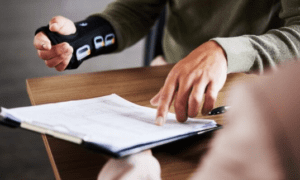Contrary to popular belief, personal injury claims are not rare. They’re also not as simple as you would think. It is essential that you comprehend not just the fundamental ideas behind a personal injury claim, but also the steps that must be taken. Prior to delving more into the subject, it is imperative that you seek guidance from a qualified legal expert in your region. For example, you can speak with a personal injury attorney by visiting https://hollislawfirm.com/ if you’re in Kansas.
You have to File your Claim within the Given Time
The most crucial part of bringing a personal injury claim is this. The statute of limitations, for the uninitiated, specifies deadlines for bringing different types of lawsuits. It is imperative that you register your claim within the state-specific legal time limit, as this differs from state to state. If you fail to do so, unless there are special circumstances, your claim can be limited.
You need to have the Relevant Proofs
A personal injury claim’s fundamental tenet is that you were injured as a result of someone else’s negligence. But keep in mind that negligence is the result of not taking the same precautions that a reasonable person would take in the same situation. It goes without saying that you will require relevant proof to back up your claims. If a fire at work causes you to sustain personal injuries, you can inquire with the local municipal office about whether your company possesses the necessary licenses.
Damages that can be Compensated
Thus, you may pursue one of three categories of damages in a personal injury claim:
Economic damages are the monetary losses you incurred as a result of the mishap.
Non-economic damages cover compensation for the emotional distress the accident caused you to experience.
While punitive damages are always available for claim, courts will only grant them in cases when the responsible party’s negligence is obviously demonstrated.
Responsibility of Proving your Damages relies on You
As previously said, you may be able to recover a variety of damages in a personal injury claim or lawsuit. But keep in mind that you’ll have to substantiate your claim in a court of law if the other party doesn’t agree with it right away. This implies that you have to gather and submit all of the proof you have for the losses you have incurred. These may include hospital expenses, records of lost wages or earning capacity as a result of the accident, and other such information.
Be Receptive to Settling outside of Court
You must understand that appearing in court is a formal procedure governed by state statutes. You must hire legal counsel, and pay the related fees. But, if you and the other party can get down and work out an out-of-court settlement, you might not even need to go to court. Mediation is an additional means of doing this. Make sure the settlement agreement covers the entire amount of compensation you are willing to accept in the event of such a settlement. Furthermore, if the other party doesn’t follow the payment terms, there should be provisions safeguarding your right. Finally, you should be aware that, in most circumstances, you will not be able to pursue the claim for additional damages in a court of law if the payment is given in full at the time of signing the settlement agreement.
A personal injury can depress you and be a distressing event in and of itself. A personal injury claim or lawsuit must take the law and the facts into account. Even though you might be familiar with the details of your case, only a lawyer with expertise handling cases similar to this one can adequately advise you. Along with providing legal advice, this information explains how to substantiate the facts of your case.



































